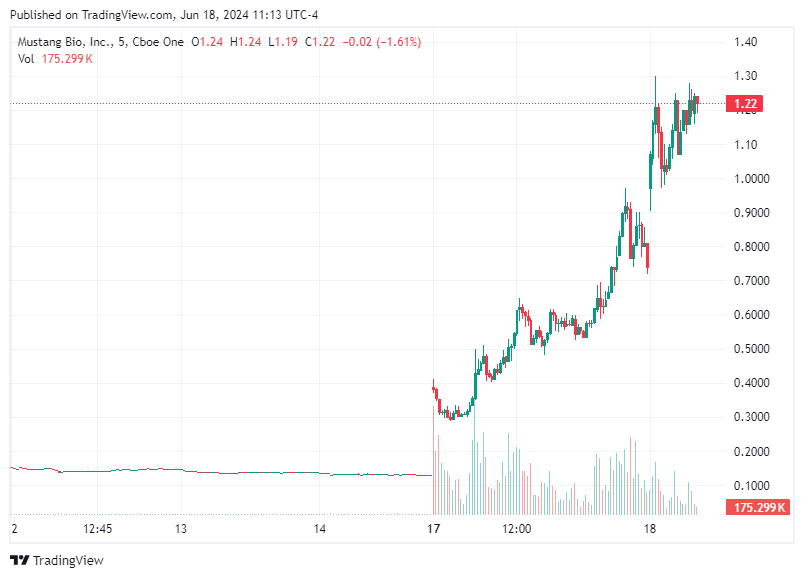Biopharmaceutical Company Announces Promising Trial Data For Blood Cancer Treatment
Mustang Bio Announces Favorable Efficacy and Safety Data from Phase 1/2 Clinical Trial of MB-106 for Waldenstrom Macroglobulinemia.

Disclaimer: The information provided in this article is based on the latest available data from clinical trials and should not be interpreted as medical advice. Always consult with healthcare professionals for medical decisions and treatment options.
Mustang Bio has recently released updated data from their ongoing Phase 1/2 clinical trial of MB-106, a CD20-targeted autologous CAR T-cell therapy. This announcement highlights the promising safety and efficacy profile of MB-106 in treating patients with Waldenstrom macroglobulinemia (WM), a rare form of blood cancer. The development of MB-106 is a collaborative effort between Mustang Bio and Fred Hutch Cancer Center, targeting patients with relapsed or refractory B-cell non-Hodgkin lymphomas (B-NHLs) and chronic lymphocytic leukemia (CLL). This article delves deep into the trial results, patient outcomes, and potential future directions for MB-106.
Waldenstrom Macroglobulinemia
Waldenstrom macroglobulinemia (WM) is a rare type of blood cancer that belongs to a group of diseases known as non-Hodgkin lymphomas. It is characterized by an abnormal increase in white blood cells called lymphoplasmacytic cells. These cells produce large amounts of an abnormal protein called monoclonal immunoglobulin M (IgM) antibody, which can cause various complications including hyperviscosity syndrome, neuropathy, and anemia. Currently, treatment options are limited, especially for patients whose disease has relapsed or who do not respond to initial therapies.
MB-106 is an autologous CAR T-cell therapy that targets CD20, a protein found on the surface of B-cells, including the malignant B-cells present in WM. Autologous CAR T-cell therapy involves collecting a patient's own T-cells, genetically modifying them to express a chimeric antigen receptor (CAR) that targets cancer cells, and then infusing these modified T-cells back into the patient. The goal is for these engineered T-cells to recognize and destroy the cancer cells.
The Phase 1/2 clinical trial of MB-106 was designed to evaluate its safety and efficacy in patients with relapsed or refractory B-cell non-Hodgkin lymphomas and chronic lymphocytic leukemia, including those with WM. The trial included heavily pretreated patients, meaning they had undergone multiple previous treatments without achieving lasting remission.
Overall Response Rate: The trial demonstrated a remarkable overall response rate of 90% among the participants. This high response rate is particularly notable given the challenging patient population involved, as all patients were heavily pretreated.
Durable Responses: Among the responders, there were durable responses observed. Notably, one patient achieved complete remission that lasted for 31 months. This indicates the potential for long-term benefits from MB-106 therapy.
Safety Profile: Safety is a critical aspect of any new therapy. In this trial, no patients experienced grade 3 or 4 cytokine release syndrome (CRS) or severe neurotoxicity, which are common and serious side effects associated with CAR T-cell therapies. Only nine patients experienced CRS, but these cases were limited to grades 1 or 2, suggesting that the side effects were manageable.
Outpatient Administration: The feasibility of administering MB-106 in an outpatient setting is another significant finding. This could potentially reduce the burden on healthcare facilities and make the treatment more accessible to a larger number of patients.
Presentation at European Hematology Association Congress
The results of this trial were presented at the European Hematology Association 2024 Hybrid Congress. This platform provided an opportunity for Mustang Bio and Fred Hutch Cancer Center to share their findings with the broader medical community, garnering attention and interest from researchers, clinicians, and potential collaborators. While the results of the Phase 1/2 clinical trial are promising, the future development of MB-106 faces certain challenges and considerations:
Patient Population: The trial involved heavily pretreated and refractory patients. While the high response rate is encouraging, it is important to assess how MB-106 performs in a broader patient population, including those with less advanced disease.
Cytokine Release Syndrome: Although no severe (grade 3 or 4) CRS was observed, nine patients did experience grade 1 or 2 CRS. Managing and mitigating even mild forms of CRS will be crucial as the therapy moves forward.
Funding and Partnerships: Advancing the development of MB-106 will require significant additional funding or strategic partnerships. Mustang Bio has indicated that further progress is contingent on securing these resources, which will be necessary for larger clinical trials and eventual commercialization.
Long-term Follow-up: Long-term follow-up is essential to fully understand the durability of responses and the overall safety profile of MB-106. The fact that only one patient required new anti-WM treatment after receiving MB-106 is a positive sign, but further monitoring is needed to confirm these initial findings.
The updated data from the ongoing Phase 1/2 clinical trial of MB-106 offers hope for patients with Waldenstrom macroglobulinemia and other B-cell malignancies. With a 90% overall response rate, durable remissions, manageable safety profile, and the feasibility of outpatient administration, MB-106 shows great promise as a therapeutic option. However, the path forward will require overcoming challenges related to funding, patient selection, and long-term monitoring. Collaborations and strategic partnerships will be key to advancing this therapy and ensuring that it reaches the patients who need it most.
Disclaimer: The information provided in this article is based on the latest available data from clinical trials and should not be interpreted as medical advice. Always consult with healthcare professionals for medical decisions and treatment options.
Real-time information is available daily at https://stockregion.net

